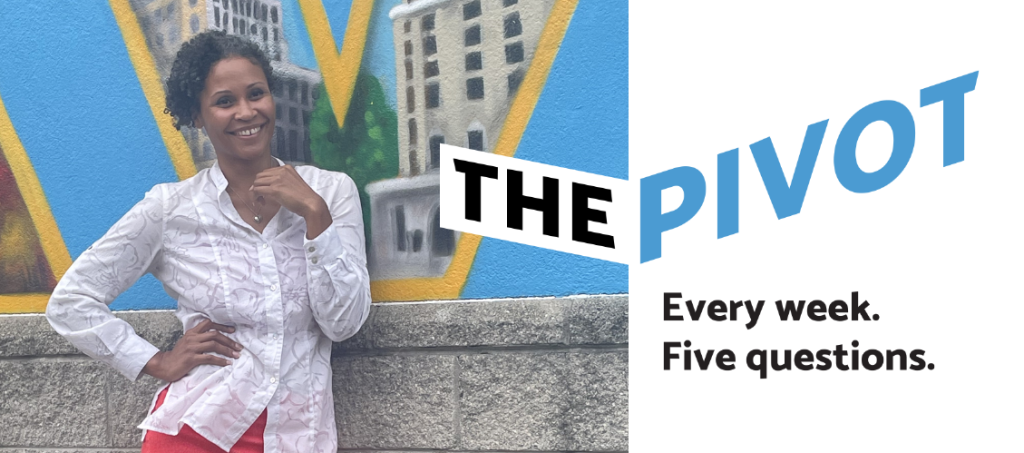The Pivot with Dr. Tamarie Macon

For Dr. Tamarie Macon, public health is another word for justice.

What’s your role in public health?
I’m an assistant professor with the Gillings School. I’m based in Asheville, North Carolina, and teach in the Place-Based Health concentration. This Master of Public health degree is the first of its kind — it’s offered jointly by the Gillings School and UNC Asheville and hosted on the Mountain Area Health Education Center (MAHEC) campus.
I really appreciate that place-based health starts with building relationships, as opposed to the more common method of identifying a problem, generating a solution and evaluating the resulting intervention. With this perspective, the very first step is getting to know the people who you want to work with and serve.
I’m also a health equity and policy executive with MAHEC, where I consult on social justice issues.
In March 2022, I was appointed by the Asheville City Council to a seat on the Community Reparations Committee. I work with the impact focus area of health and wellness, which goes hand in hand with the other focus areas named in these reparations resolutions. They are some of the major social determinants: education, housing, criminal justice and economic development. (I’m also a member of the economic development work group.)
Finally, I’m co-principal investigator on a two-year initiative funded by the Robert Wood Johnson Foundation (RWJF). Titled, “Black Community’s Vision for and Accountability of a Local Reparations Process,” the work is being done in conjunction with the Asheville Racial Justice Coalition.

Can you describe your focus area in one sentence?
I can do it in one word: Justice.
Elaborating on that, I strive to co-create understandings of what justice looks like and support the enactment of justice with and for Black people.
I co-teach a class on health policy for social justice, and I share Dr. Camara Jones’ three principles for health equity. Two of those principles are that social justice means giving according to need, and that justice requires recognizing and rectifying historical (and current) injustices. That’s where reparations intersect with public health.

What brought you to public health?
In a way, it was circumstance. I played volleyball as an undergraduate, and I had to declare a major by a certain time. I was fortunate enough to have been accepted to an undergrad research fellowship through the National Science Foundation-funded Project L/EARN at Rutgers Institute for Health, Health Care Policy and Aging Research, which exposed me to some of what the field can be. That led me to earn a bachelor’s degree in public health.
I’ve always been interested in many things, and I especially care about children. That passion guided me to earn master’s and doctoral degrees in psychology and education. I’m happy to now be teaching in such an interdisciplinary field, because public health really touches everything. There is space to bring in all my interests.

Public health is a huge and rapidly evolving field. Can you describe a time when you have pivoted in the course of your career?
I pivoted when I turned down a teaching position to work full-time in a U.S. Senator’s office on Capitol Hill. I pivoted again when I applied to a doctoral program despite not meeting the posted prerequisites for credit hours — and I got in. (The lesson: Always be open to the possibilities. And question the “requirements.”)
Most recently, our team on the RWJF-funded Policies for Action grant has pivoted again and again, because our work evolves based on what we learn from our community. We call the campaign “Every Black Voice” because we go door-to-door, trying to speak with all the Black people in our area and hear what they want from the reparations process. From the beginning, we have compensated people for their time and expertise. All of the staff are Black, and several are Asheville natives.
In the course of our work, we’ve pivoted to hold more public events in addition to the door-to-door campaign. We wear name tags and branded T-shirts so it’s immediately clear which group we’re with.
I’d also like to offer some general advice I’ve gleaned from this work.
First, when you seek to work with a community or organization, bring your skills — not your agenda. The Racial Justice Coalition receives the bulk of the funds from the RWJF grant, and that’s intentional. When I presented the possibility of the grant to them, I wanted to know whether and how I could serve their larger goals. I was willing to forego funding if it was not aligned with their priorities.
Second, keep love at the center of all you do. The Racial Justice Coalition models that what’s essential isn’t a certain research pedigree but love for Black people and a desire to achieve justice — to build and maintain community and understand that learning goes both ways. That approach actually led to another pivot: We’re reworking the interview questions that our canvassers ask so the questions are more understandable and, rather than one-way interviewing, the process leads to more meaningful bidirectional conversations.

Who are you when you’re at home?
Well, I still play volleyball! (Mostly outdoors, and mostly doubles.) I like to try new things — the most recent examples being mountain biking and axe throwing. I’m committed to body work, including massage and somatic therapy. I’m also a poet and a nonfiction writer, and I’m proud to say I have a new piece called “Language Matters: Why We Need To Stop Talking About Eliminating Health Inequities” on the Health Affairs Forefront blog.
Read more interviews in The Pivot series.
Published: 10/27/2022
